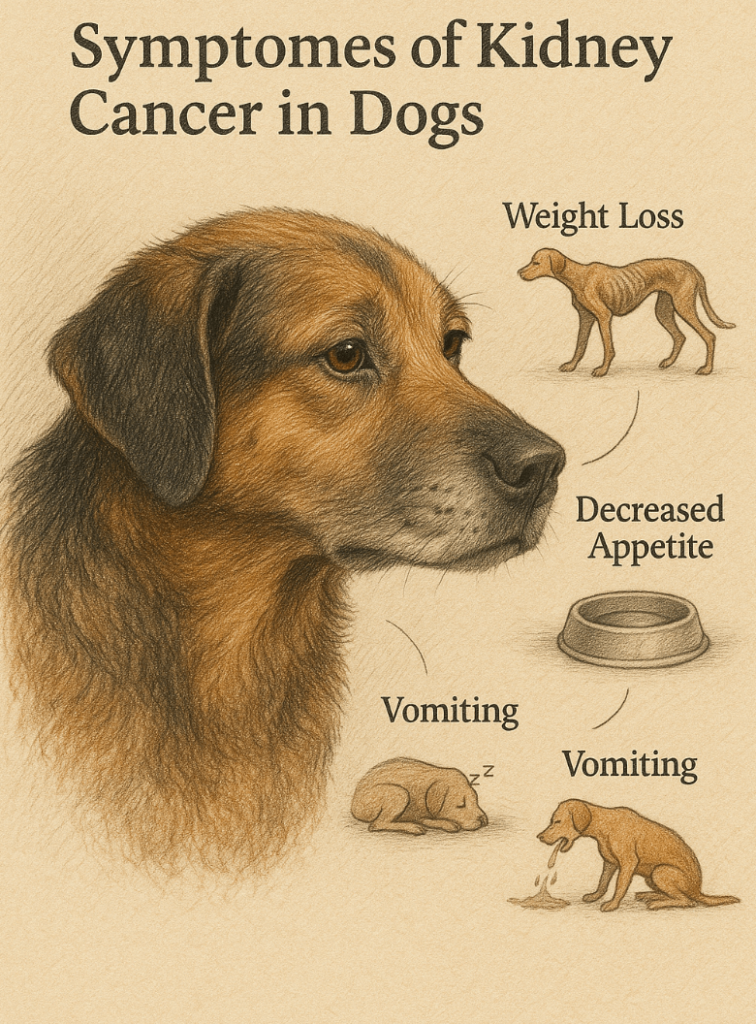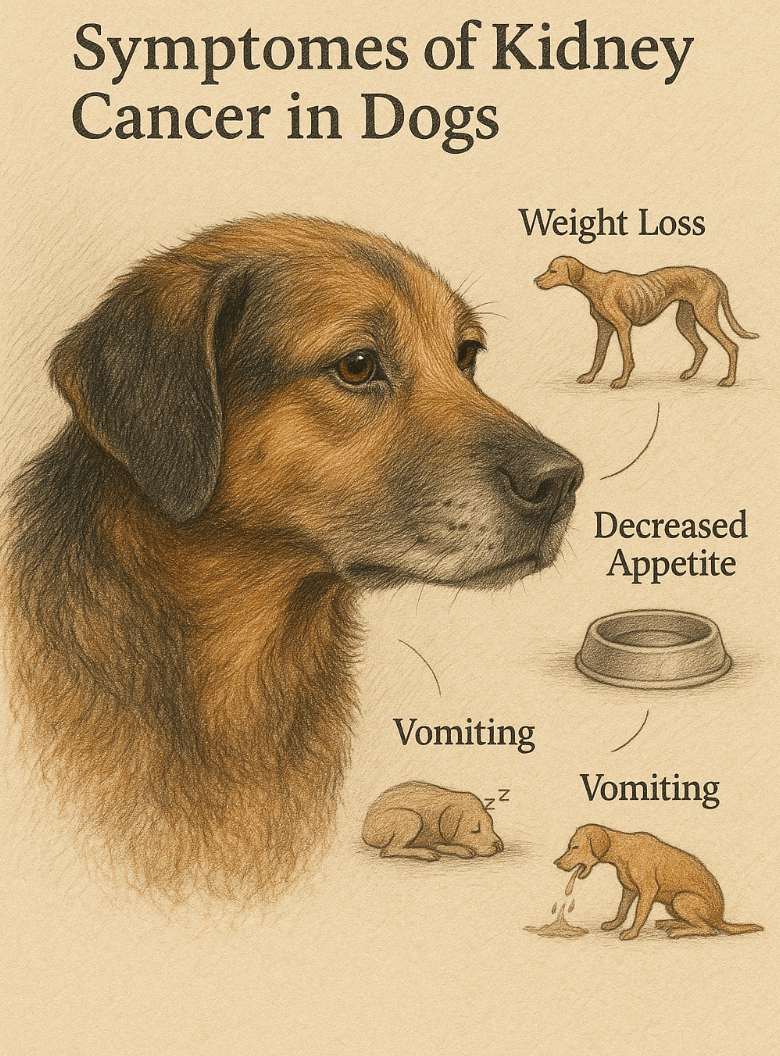Dog Kidney Cancer Symptoms: What Every Pet Owner Should Know
Kidney cancer in dogs is a serious condition that requires early detection and proper management. While it’s not as common as other forms of cancer, kidney tumors can significantly impact a dog’s quality of life if left untreated. Recognizing the symptoms of kidney cancer is crucial for pet owners who want to ensure their furry companions receive timely veterinary care. From changes in behavior to physical signs, understanding what to look for can make all the difference. In this blog post, we’ll explore the key symptoms of dog kidney cancer, discuss its potential causes, and provide actionable tips for supporting your dog’s health.
Common Symptoms of Dog Kidney Cancer
Detecting kidney cancer in dogs early can be challenging, as the symptoms often overlap with other health issues. However, paying attention to subtle changes in your dog’s behavior or appearance can help you identify potential problems sooner.
Increased Thirst and Urination:
Dogs with kidney cancer may drink excessive amounts of water and urinate more frequently due to impaired kidney function.Weight Loss and Appetite Changes:
Unexplained weight loss or a sudden lack of interest in food can indicate underlying health issues, including kidney cancer.Lethargy and Weakness:
Dogs may appear unusually tired, reluctant to play, or struggle with basic activities like walking or climbing stairs.Vomiting or Diarrhea:
Digestive issues such as vomiting or diarrhea can occur as toxins build up in the body due to compromised kidneys.Abdominal Swelling or Pain:
A noticeable enlargement or tenderness in the abdominal area may suggest the presence of a tumor or fluid buildup.
If your dog exhibits any of these symptoms, it’s important to consult a veterinarian promptly for a thorough evaluation.
Other Signs That May Indicate Kidney Cancer
While the primary symptoms of kidney cancer are well-documented, there are additional signs that pet owners should watch for. These indicators, though less common, can provide valuable clues about your dog’s health.
Bad Breath or Oral Ulcers:
Toxins accumulating in the bloodstream due to kidney dysfunction can lead to foul-smelling breath or sores in the mouth.Pale Gums or Anemia:
Poor kidney function can result in anemia, causing pale gums and a lack of energy in affected dogs.Blood in Urine:
The presence of blood in your dog’s urine may signal kidney damage or the presence of a tumor.Difficulty Breathing:
Advanced kidney cancer can cause fluid buildup in the lungs, leading to labored breathing or coughing.Behavioral Changes:
Dogs may become irritable, withdrawn, or unusually clingy as they cope with discomfort or pain.
Being vigilant about these secondary signs can help you catch kidney cancer early and improve your dog’s chances of recovery.
Check this guide 👉Kidney Stones in Dogs: Best 7 Expert Tips!
Check this guide 👉Caring for a Dog in the Last Days of Kidney Failure: Best 7 Tips

Symptoms of Kidney Cancer in Dogs | Possible Causes of These Symptoms |
|---|---|
Increased thirst and urination | Impaired kidney filtration |
Weight loss and appetite changes | Metabolic imbalances from cancer |
Lethargy and weakness | Toxin buildup affecting energy levels |
Vomiting or diarrhea | Digestive distress linked to toxins |
Abdominal swelling or pain | Tumor growth or fluid retention |
Risk Factors for Dog Kidney Cancer
Certain factors can increase a dog’s likelihood of developing kidney cancer. Understanding these risk factors allows pet owners to take preventive measures and monitor their dogs more closely.
Age:
Older dogs are more prone to kidney cancer, as the risk increases with age.Breed Predisposition:
Certain breeds, such as Golden Retrievers and German Shepherds, may have a higher susceptibility to kidney tumors.Environmental Toxins:
Exposure to chemicals, pesticides, or contaminated water can contribute to kidney damage over time.Poor Diet:
A diet lacking in essential nutrients or high in harmful additives may strain the kidneys and weaken their function.Chronic Kidney Disease:
Dogs with pre-existing kidney issues are at greater risk of developing cancerous growths in the kidneys.
By addressing these risk factors, pet owners can reduce the likelihood of kidney cancer and promote overall health.
Steps to Take If You Suspect Kidney Cancer in Your Dog
If you notice any signs of kidney cancer in your dog, acting quickly is essential to ensure the best possible outcome. Here’s what you should do next.
Schedule a Veterinary Appointment:
Visit your vet as soon as possible to discuss your concerns and arrange diagnostic tests.Request Blood and Urine Tests:
These tests can assess kidney function and detect abnormalities indicative of cancer.Consider Imaging Studies:
X-rays or ultrasounds may be necessary to visualize tumors or other irregularities in the kidneys.Discuss Treatment Options:
Depending on the diagnosis, treatments such as surgery, chemotherapy, or palliative care may be recommended.Adjust Your Dog’s Diet:
A specialized diet low in protein and phosphorus can ease the burden on the kidneys and improve your dog’s comfort.
Taking these steps ensures your dog receives the care they need while giving you peace of mind.
Ways to Support a Dog with Kidney Cancer
Caring for a dog with kidney cancer requires dedication and compassion. Here are practical ways to enhance their quality of life during treatment.
Provide Comfortable Resting Spaces:
Ensure your dog has a cozy, quiet place to rest and recover from fatigue or discomfort.Monitor Fluid Intake:
Encourage hydration but avoid overhydration, which can strain already-compromised kidneys.Administer Medications as Prescribed:
Follow your vet’s instructions carefully to manage pain and slow cancer progression.Engage in Gentle Exercise:
Short, leisurely walks can help maintain muscle tone without overexertion.Offer Emotional Support:
Spend quality time with your dog, offering affection and reassurance during this difficult time.
These efforts can make a meaningful difference in your dog’s daily life.
Preventive Measures to Reduce Kidney Cancer Risk
While kidney cancer cannot always be prevented, certain measures can lower the risk and promote long-term kidney health.
Provide Clean Drinking Water:
Ensure your dog has access to fresh, filtered water free from contaminants.Feed a Balanced Diet:
Opt for high-quality dog food formulated to support kidney health and overall vitality.Limit Exposure to Toxins:
Keep household chemicals, pesticides, and other hazards out of reach.Schedule Regular Vet Checkups:
Routine exams can catch early warning signs before they escalate into serious issues.Maintain a Healthy Weight:
Obesity can strain the kidneys, so keeping your dog at a healthy weight is essential.
Proactive prevention helps safeguard your dog’s health and happiness.
Understanding the Emotional Impact on Pet Owners
Dealing with a dog’s kidney cancer diagnosis can be emotionally taxing for pet owners. Acknowledging these feelings is an important part of the journey.
Grief and Anxiety:
It’s normal to feel overwhelmed by fears about your dog’s prognosis and future.Financial Stress:
The cost of treatment and ongoing care can add financial pressure, requiring careful planning.Decision-Making Challenges:
Choosing between treatment options or end-of-life care can be heart-wrenching for many owners.Support Networks:
Connecting with other pet owners or support groups can provide comfort and advice during tough times.Celebrating Small Wins:
Focusing on positive moments, like a good day or a wagging tail, can bring joy amid challenges.
Recognizing and addressing these emotions helps you navigate the experience with resilience and hope.
Frequently Asked Questions About Dog Kidney Cancer
What are the first signs of kidney cancer in dogs?
Early signs include increased thirst, frequent urination, weight loss, and lethargy.
Is kidney cancer in dogs treatable?
Treatment options depend on the stage and type of cancer, but early intervention can improve outcomes.
Can diet help manage kidney cancer symptoms?
Yes, a kidney-friendly diet can support kidney function and alleviate some symptoms.
How is kidney cancer diagnosed in dogs?
Diagnosis typically involves blood tests, urine analysis, and imaging studies like X-rays or ultrasounds.
What breeds are most at risk for kidney cancer?
Breeds like Golden Retrievers, German Shepherds, and Boxers may have a higher predisposition.
Staying Vigilant for Your Dog’s Health
Kidney cancer in dogs is a complex and challenging condition, but early detection and proactive care can make a significant difference. By familiarizing yourself with the symptoms, risk factors, and available treatments, you can advocate for your dog’s well-being and ensure they receive the support they need. Remember, your role as a pet owner is invaluable—your attentiveness and love can help your furry friend live a longer, healthier life. Stay informed, trust your instincts, and work closely with your veterinarian to give your dog the best possible care.
Do Cats Have Taste Buds? Best 7 Expert Tips! – Discover how cats experience flavors and why their taste is so unique.
Do Dogs Have Taste Buds? Best 7 Expert Tips! – Discover how dogs experience taste, their preferences, and what it means for their diet and health.
Can Cats Taste Sweet? Best 7 Expert Tips! – Discover why cats can’t taste sweetness, how it affects their diet, and tips to keep them healthy and happy.
Can Dogs Taste Sweet? Best 7 Expert Tips! – Discover how dogs perceive sweetness, which foods are safe, and tips to manage their sweet cravings responsibly.





